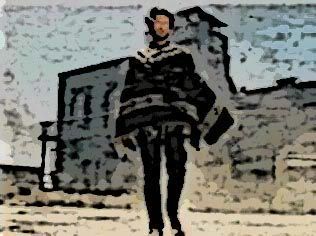Lacan and Intellectual Games
http://www.richardwebster.net/lacangoestotheopera.html
"Jacques Lacan was a phenomenon of the extraordinary intellectual life of France which grew up during the late 1960s. Almost unheard of for most of his life and a virtual nonentity within the international psychoanalytic movement, he was suddenly elevated to the rank of a maître penser at the age of 65 with the appearance of Ecrits, a large volume of his papers on psychoanalytic themes. In these writings, and throughout his career as a charismatic intellectual prophet, Lacan proclaimed himself as the leader of a ‘return to Freud’. Although Lacan’s self-proclamation as Freud’s true heir was credulously and eagerly accepted by many Parisian intellectuals, some early readers of Ecrits were puzzled. In the first place Lacan’s work apppeared to be a chaotic amalgam of the ideas of Hegel, Saussure, Lévi-Strauss and others which, while presented under the cover of psychoanalytic terminology, bore scarcely any resemblance to the original theories of Freud. In the second place (and it was this which made it difficult to pin down Lacan’s astonishing divergence from Freud) Lacan’s writings were frequently opaque to the point of incomprehensibility. Even Lacan’s own followers will often readily admit that they find large portions of his work quite unintelligible. The situation was perhaps best summed up by an advertisement for a psychoanalytic magazine which appeared in France shortly before Lacan’s death in 1981: ‘January 1980. There are thousands of people who do not understand Lacan. In 1950 there were only twenty or thirty.’
During his lifetime Lacan became notorious not only for the obscurity of his prose but also for the shortness of his treatment sessions. Latterly these sessions lasted between three and ten minutes with one of Lacan’s patients paying £110 for a session which lasted barely a minute and was conducted at the entrance of his apartment through a door barely ajar."
"The ultimate emptiness of the mysteries which Lacan expounded in his seminars, and of his entire intellectual enterprise, is perhaps best conveyed by his last major project – in which, having already reduced human psychology to a series of pseudo-algebraic linguistic equations, he set out to discover the mathematical formulae (‘mathemes’) to which he believed all human psychology could be reduced. As equations, ratios, arrows and diagrams of complex knots covered the blackboard in the three-day meeting on mathemes which took place in 1976, many members of Lacan’s audience felt guilty at understanding nothing or very little of something that, as one of them put it, ‘everyone important seems to feel is so crucial’."
''on the one occasion when Lacan appeared on television, he said that he would not alter his notoriously impenetrable style because he simply did not care to speak to idiots: my discourse, he said, is for those who are not idiots.''....''if his theory has validity, one should be able to articulate it with clarity and precision,''.
"Jacques Lacan was a phenomenon of the extraordinary intellectual life of France which grew up during the late 1960s. Almost unheard of for most of his life and a virtual nonentity within the international psychoanalytic movement, he was suddenly elevated to the rank of a maître penser at the age of 65 with the appearance of Ecrits, a large volume of his papers on psychoanalytic themes. In these writings, and throughout his career as a charismatic intellectual prophet, Lacan proclaimed himself as the leader of a ‘return to Freud’. Although Lacan’s self-proclamation as Freud’s true heir was credulously and eagerly accepted by many Parisian intellectuals, some early readers of Ecrits were puzzled. In the first place Lacan’s work apppeared to be a chaotic amalgam of the ideas of Hegel, Saussure, Lévi-Strauss and others which, while presented under the cover of psychoanalytic terminology, bore scarcely any resemblance to the original theories of Freud. In the second place (and it was this which made it difficult to pin down Lacan’s astonishing divergence from Freud) Lacan’s writings were frequently opaque to the point of incomprehensibility. Even Lacan’s own followers will often readily admit that they find large portions of his work quite unintelligible. The situation was perhaps best summed up by an advertisement for a psychoanalytic magazine which appeared in France shortly before Lacan’s death in 1981: ‘January 1980. There are thousands of people who do not understand Lacan. In 1950 there were only twenty or thirty.’
During his lifetime Lacan became notorious not only for the obscurity of his prose but also for the shortness of his treatment sessions. Latterly these sessions lasted between three and ten minutes with one of Lacan’s patients paying £110 for a session which lasted barely a minute and was conducted at the entrance of his apartment through a door barely ajar."
"The ultimate emptiness of the mysteries which Lacan expounded in his seminars, and of his entire intellectual enterprise, is perhaps best conveyed by his last major project – in which, having already reduced human psychology to a series of pseudo-algebraic linguistic equations, he set out to discover the mathematical formulae (‘mathemes’) to which he believed all human psychology could be reduced. As equations, ratios, arrows and diagrams of complex knots covered the blackboard in the three-day meeting on mathemes which took place in 1976, many members of Lacan’s audience felt guilty at understanding nothing or very little of something that, as one of them put it, ‘everyone important seems to feel is so crucial’."
''on the one occasion when Lacan appeared on television, he said that he would not alter his notoriously impenetrable style because he simply did not care to speak to idiots: my discourse, he said, is for those who are not idiots.''....''if his theory has validity, one should be able to articulate it with clarity and precision,''.


<< Home